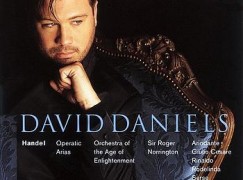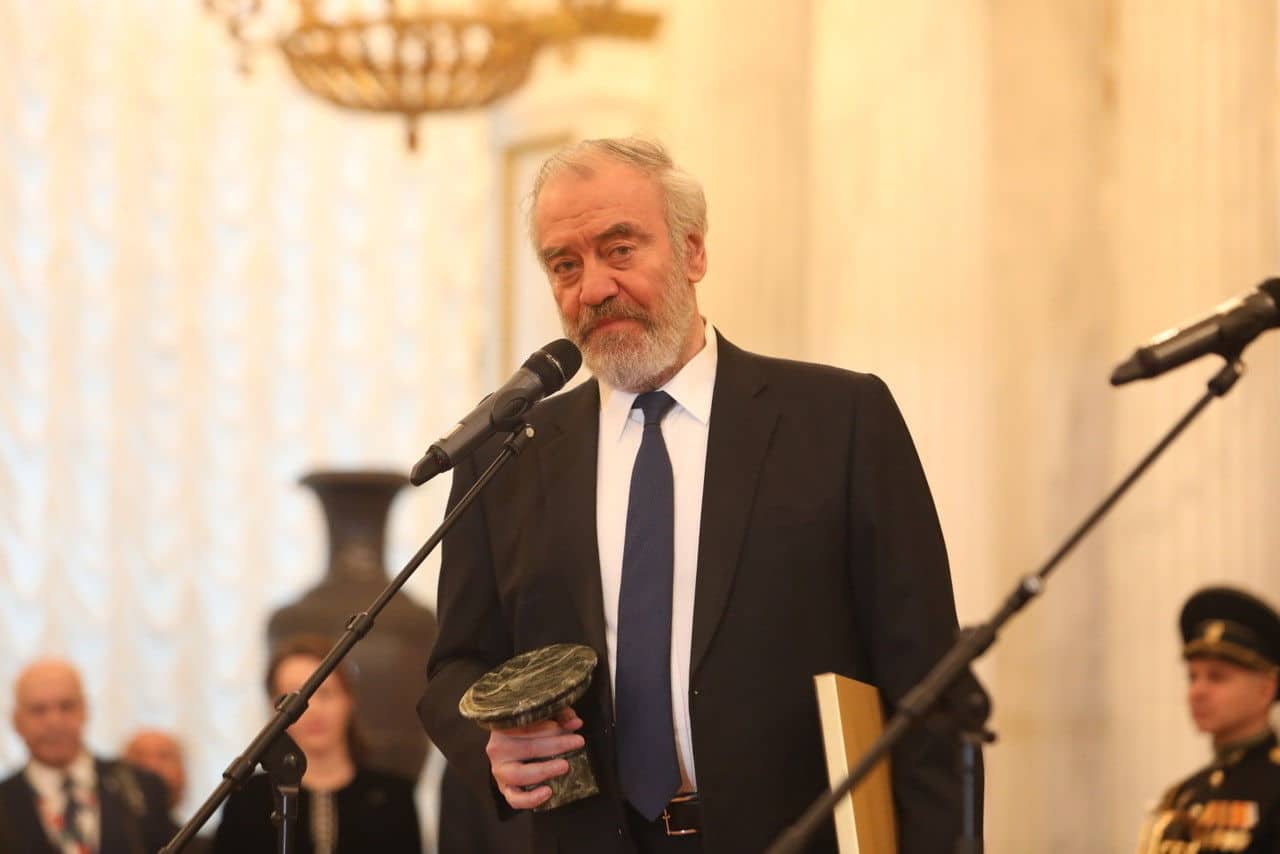A second case opens against David Daniels
mainThe US countertenor, accused of rape by a former protege, now faces the possibility of a police charge over attempted solicitation on the gay pickup site Grindr, it is reported.
More here.


The US countertenor, accused of rape by a former protege, now faces the possibility of a police charge over attempted solicitation on the gay pickup site Grindr, it is reported.
More here.

Early in his international career, Valery Gergiev professed…

The death has been made known of Lea…

Vladimir Putin has issued a decree granting Russian…

We hear that Stephen Rose, former head of…

Session expired
Please log in again. The login page will open in a new tab. After logging in you can close it and return to this page.
oh give me a f** break
I’m not sure I’m understanding this one.
“The singer and the alleged victim exchanged messages on the gay dating app known as Grindr in February 2017, Harshberger said. He declined to elaborate on the nature of the messages other than to say Daniels is accused of asking for a sex act.”
The article mentions no allegation of money discussed or proposed or exchanged which is what I thought “solicitation” involved.
Just “asking” for sex is a crime? Isn’t that what grindr was invented for?
“Just “asking” for sex is a crime? Isn’t that what grindr was invented for?”
Yes. This is a non-story, taken at face value.
There’s no ‘e’ in ‘Grindr’, Norman!
Is it usual for American universities to maintain their own police forces? In the UK the only university that retains its own police force is Cambridge, which maintains a force of 23 sworn constables who exercise jurisdiction within a five-mile radius of Great St Mary’s, the university church. The University of Oxford maintained its own police force until 2003 when the university constables were redesignated proctors’ officers, meaning that while they perform many of the same duties as the university constables, they no longer enjoy the powers of a sworn constable (although they can of course make an any-person arrest under the provisions of the Police and Criminal Evidence Act 1984 s. 24A). When university constables were established by the Universities Act 1825, Oxford and Cambridge were the only universities in England and Wales and therefore are the only universities that have ever enjoyed the right to attest their own constables. Policing within British universities is therefore in almost all instances the responsibility of the local territorial police force (an exception, for example, would be when a member of the royal family visits a university outside of the Metropolitan Police District, when the Metropolitan Police Service will exercise jurisdiction for purposes of personal protection).
yes it is customary for larger unis to have a police force
make of that what you will
Yes, it’s quite common though they are not technically “police” since they can’t make arrests, have no legal authority and, in most cases, do not carry firearms.
They are real police. Here in Texas they are.
They make arrests, investigate crimes, file charges, carry weapons….
I lived in Houston and San Antonio but did not have any university connections. In many places, they are not “police,” though I see that Texas is different. I’m a graduate of the State University of New York – those folks did not carry guns, make arrests, etc.
…and undoubtedly shoot to kill!
After all, it’s the land of the free….
Not only in Texas. The University of Chicago has its own police force which carries weapons (and occasionally has to fire them) and makes arrests. They cooperate closely with the Chicago Police Department. Quite honestly they make the Hyde Park neighborhood much safer than it would otherwise be, as the CPD can’t be everywhere.
There was a well-known case where a University of Cincinnati police officer shot and killed an unarmed man in a car… he claimed the man pulled a gun on him then dragged him several feet… however, the officer’s body cam showed the man only made some kind of movement with his hand, whereupon the officer shot him and immediately fell over backward while the car (probably in response to the victim’s spasming muscles) slowly drove several yards and hit a tree.
I don’t remember if the officer was punished in any way, either for the shooting or the lying. Probably not, since he was white, the victim was black, and this is the US.
Yes, it is typical for American Universities to maintain a police force.
The explanations I’ve seen in the past include…
-fast response time when there is a problem
-The policing effort needed for a student body of tens of thousands of students would be an unfair burden to offload on the host city and its taxpayers which might even be an otherwise small town.
-The U police officers have been further trained to deal intelligently with young adult problems that a general police force might not be.
I think it stems from an earlier idea of colleges as existing “in loco parentis”. Problems of conflict of interest in addressing (alleged) sex crimes is helping put an end to this.
Is there a lawyer on the site?
I am an attorney-Most large Universities and most State Universities have real police forces on campus. Most smaller schools employ security “police” that may carry weapons but cannot make arrests, other than citizens arrests. This issue is governed by State Law.
Interesting titbits there from Alex. Didn’t know that! Thanks.
Thanks for a large number of replies, all interesting! In the case of university police who don’t have a power of arrest I guess that they are more or less analogous to the security department in most British universities. Obviously security guards don’t carry weapons, but nor do our police officers, except in exceptional circumstances, so there’s no real difference there. Where it may be different from what I read here is that security guards don’t have any power to investigate crime and can’t submit evidence to prosecutors (any more than any member of the public can), so if an actual crime takes place the police need to be called in to make arrests, gather evidence, send a file to the Crown Prosecution Service, etc.
It seems also that some of the reasons for US universities having their own police forces just wouldn’t apply in the UK. For one thing, our territorial police forces are responsible for policing much larger areas and receive most of their funding from central government, so there isn’t much of an issue about being a burden on local communities. In Scotland and Northern Ireland there’s just one police force for the whole of each country. And further to that, most of the country’s largest universities also tend to be located in the country’s largest cities. There are exceptions, e.g. the University of Hertfordshire, which has nearly 25,000 students, is based in the small town of Hatfield.
Also, in the UK the idea of a university campus (e.g. East Anglia, Keele, Sussex) is the exception rather than the rule. Most universities are pretty well integrated into the cities in which they are located. In Oxford, for example, it’s a long-running joke that tourists, usually American, will ask where the university is. The correct answer is that it’s located on various sites throughout the city. Some students apparently like to play a trick on them by telling them that the university is in Wellington Square, since this is the location of the university’s very small central administration. I think a better joke is when tourists are told that the Martyrs’ Memorial is the spire of an underground church, the entrance to which is located in the nearby public lavatories, although I’m not sure whether anybody has actually fallen for that one.
The detail over which I stumbled immediately in your initial post is the claim that said university police in Cambridge would „exercise jurisdiction“ in some area. It has been my understanding up to now that jurisdiction is most definitely not a police task in any acceptable legal system.
I merely mean exercise jurisdiction as police officers, e.g. arresting suspects, searching premises, taking statements from witnesses, preparing files for prosecutors, etc. Every police force has a specific area over which it exercises jurisdiction. For example, British Transport Police exercises jurisdiction over railway, light rail, metro, and tram services in England, Wales, and Scotland, including tracks, rolling stock, stations, and depots. I once reported a crime to my local police force and it took them some time to begin an investigation because the perpetrator had committed offences all over the country and they had to decide which force had the jurisdiction to investigate the case. Of course, the university constables in Cambridge do very little actual police work and any serious crimes committed would be investigated by the Cambridgeshire Constabulary.
Just to add. In England and in Scotland, police forces once had jurisdiction/responsibility over very small areas (such as single small town). Over time the police jurisdictions have been amalgamated into larger and larger areas. But some small police forces do still exist in England, such as “City of London police”, which are separate from the Met.
This is definitely a crime
https://www.youtube.com/watch?v=oIZLllrNYA4
1:35 highlights a problem I have with Grindr and the like. The photo which is uploaded scarcely conveys much of what the young lad actually looks like in real life ( i’m measuring this by the sense I have of him on the video) much of which has to do with voice, mannerisms etc.
I didn’t make it to 1:35…
This is a total bullshit charge. Anyone who honestly thinks this is something to pursue is an idiot. This lad is simply capitalizing on the attention from the rape allegation… he would never have done this otherwise and we all know it. People are such attention whores.
I have read a couple of articles published here in the USA regarding this recent allegation against David Daniels, but I can’t figure out what was illegal. One article mentioned “solicitation” which usually implies asking for sex in exchange for money, which is illegal.
I am curious as to why the police are involved if Daniels was simply trolling for sex on a gay hook-up site.
There has to be a lot more to this story than that.
Trolling for sex on a gay hook-up site? Could be buying spare parts for a car. Sad that people cannot form decent human relationships. Oh well, there’s always pets.
Bravo Sue, you are not only a reactionary but also a homophobe.
Not news.
Sue we are so tired of your thinly disguised homophobia. Furthermore there are lot of guys
(and gals too) who are not interested in your idea of a “decent” relationship and greatly
prefer indecent incidental hookups. So what? They often have other ways of bonding to those close to them, but this may come as a great surprise to a straight heterosexual woman from a puritanical anglo culture.
“Thinly disguised”? I haven’t noticed any kind of disguise.
“Former protege”? Are you kidding me? Nothing in Schultz’s story suggests Daniels having such a role in his life. Norman, your headline is completely irresponsible and clickbait. If your intention is to make these unproven allegations against Daniels seem more awful then you are succeeding.
From Schultz: “When asked about Daniels’ leave and the possibility of further actions taken, Schultz said: “I have no interest in putting pressure on institutions to do anything. What I have an interest in is making sure that people know that their bodies and minds are valued.”
“Former protege”? Are you kidding me? Nothing in Schultz’s story suggests Daniels having such a role in his life. Norman, your headline is completely irresponsible and clickbait. If your intention is to make these unproven allegations against Daniels seem more awful then you are succeeding.
From Schultz: “When asked about Daniels’ leave and the possibility of further actions taken, Schultz said: “I have no interest in putting pressure on institutions to do anything. What I have an interest in is making sure that people know that their bodies and minds are valued.”
Doesn’t sound like he’s interested in pressing charges.
Never trust a countertenor.
With this comment you did your pen name proud, luigi nonono.
+1
..could it be a testes thing?
Wow, only four years? That was quick. DD must not be “getting any” at home, the poor thing.
Time for a divorce from Scott Walters.
A 19-year old puts his photo (or a photo) and some personal information on a gay dating site like Grinder. Maybe he’s looking for friendships. Maybe more. Does anyone really know? He is then contacted by another member of that dating site who, it seems, makes some suggestions that involve possible a meeting, possibly a meeting involving sex.
So what is the issue here? How did the 19-year old know it was David Daniels and that David Daniels is a famous counter-tenor? I cannot believe David Daniels puts his real photo up on that site for all the world to see. Nor his profession. So the two men – yes, they are men, not boys – must at some stage have exchanged photos and some personal information. If not, how did the younger man know David Daniels’ name and profession? Surely anyone of 19 who is even just reasonably good-looking and makes a decision that he will put his information up on a gay/straight/whatever dating site, is not stupid! He knows what he is doing. He is going to check out others who are members. No doubt he has contacted some by ‘hitting’ them. Similarly, he knows that he is going to get ‘hits’ probably by quite a lot of other members. Probably, although we cannot know for sure in this case, this is what he is looking for. Even so, what on earth is all the fuss about?
In that article, the police say that “attempted solicitation is a misdemeanor.” What does that mean? Clearly if a minor is involved there is a breach of law. What is the age of consent in that state? If it is over 19, then how come a 19-year old can be a member of any dating site? That person is then surely committing a felony and the dating site guilty of something. But if 19 is over the age of consent and the police proceed with a charge against Daniels, how can any dating site – and I assume that the vast majority of these sites are for heterosexual meetings – continue in business?
If it is a case that money was involved, once again there has to be far more than considerable doubt. Who asked for it? If it was the younger man, is he then guilty of attempted prostitution? If the older, what is the legal position if the younger then declines? What low has been broken? Who actually offered it? Was it to cover taxis to and from wherever?
I could go on and on. But this new “case” seems utterly stupid and should never have gone this far.
Ah, just what this story needed: lots more speculation.
How bright! And I assume you have facts?
Nobody does at this stage, so why write 450 words of uninformed ramblings?
And you had to read them all? You are perfectly entitled not to read posts as you are to ignore posters with whom you do not agree.
As far as I understand it (which isn’t far), “solicitation” means either asking for or offering money in exchange for sex. The article doesn’t say whether that happened, so it’s not clear what about this encounter was illegal… unless it’s some weird old Michigan state law that’s still on the books from the 19th century (along the lines of “illegal to spit on the sidewalk on a Sunday”).
“The singer and the alleged victim exchanged messages on the gay dating app known as Grindr in February 2017, Harshberger said. He declined to elaborate on the nature of the messages other than to say Daniels is accused of asking for a sex act. Attempted solicitation is a misdemeanor, he said.”
OMG, LOL, how insane.
So the ‘victim’ was subscribing to a dating app which has the sole purpose for people to hook up for dating and – well, that’s just the reality – have sex. And ‘the singer’ asked for sex, in that app, that exists mainly, for people to meet for sex.
What am I missing? Can someone explain?
It wasn’t just solicitation, it was requesting sex of a university freshman in exchange for money.
David Daniels and Scott Walters seem to be among that group of gay male predators who believe that drug raping someone is a form of sex and feel they are entitled to do whatever they want to other, especially younger, gay men due to their status. Certainly this young man did more at the time than many traumatized male rape victims. He tried to seek medical attention right away, it is a shame he had to wait two weeks for a doctors appointment (but such is the case with university health systems). I hope these two predators end up in the gutter with their teeth kicked out to set an example for the rest of those predators that are out there. I sincerely doubt they will be convicted of anything in this case due to the statute of limitations, but he will probably be unemployable (outside of the gay community, inside the gay community others like him will probably make sure he is taken care of). Also another case is already forthcoming.
… but kicking his teeth in might ruin his precious voice …
A Google search tells me that solicitation is an offence under Michigan Compiled Laws 750.448, which apparently is a statute dating from 1931. Apparently solicitation means soliciting ‘another person … to commit prostitution or to do any other lewd or immoral act’. The ‘any other lewd or immoral act’ part seems pretty broad. I guess anybody using a dating app (at any rate one such as Grindr, which I understand is mainly used to arrange casual sex) could be said to be soliciting for ‘lewd’ or ‘immoral’ acts, depending how one defines ‘lewd’ and ‘immoral’. The prostitution part, however, is pretty straightforward. I guess we just have to wait to find out which part of the wording of the statute is being referred to. Whatever the Michigan Legislature had in mind in 1931, I can only imagine that a court today would not interpret ‘lewd’ or ‘immoral’ as including homosexuality. Does Slipped Disc have any readers from the Michigan bar?
I was not a member of the Michigan bar, but, this is not really a Michigan issue, it is a Federal issue; actually, more than one Federal issue. (My 14.5 minutes of fame happened long ago, helping Alan Dershowitz win a new trial for Claus von Bülow; the resulting PTSD made me become a classical music record producer.)
The more important issue is, “void for vagueness.” If a penal statute is insufficiently specific, which means, does a normal person understand well enough what is being prohibited that he can avoid doing it, then the courts usually invalidate the statute because it vests too much power in “the cop on the beat” to decide for him or herself what is “lewd ” or “immoral.”
The macro but more nebulous is whether the US Supreme Court’s invalidation of state statues criminalizing homosexual sexual relations invalidates the statute “as applied.” I no longer practice law, but, the easy win I think is “void for vagueness.” The statute does not specifically mention (as quoted) homosexual acts, so, that is the threshold you have to get over.
As a law-review-article issue, whether the statute is only applied rarely and then only for political or scores-settling purposes, the issue of a “desuetudinal” statute, could be raised.
Speaking as an educated layperson rather than as a retired lawyer, I will say, it sounds fishy to me.
john marks
Thanks, that’s very interesting and introduces various aspects that would be entirely unknown to me from this side of the Atlantic. It makes sense that a nearly 100-year-old statute could not be used to prosecute somebody for doing something that millions of Americans do every day without fear of prosecution simply because the defendant is famous.
Interestingly, although I appreciate that the analogy is relevant only up to a point, after male homosexuality was partially decriminalised in England and Wales in 1967, prosecutions for homosexual offences actually increased, as the police and courts enforced the remaining laws all the more vigorously. As recently as 1998 there was widespread outrage when seven men (known as the Bolton 7) were prosecuted, and convicted, for engaging in group sex, an activity which people knew to be in theory illegal but generally assumed would never be prosecuted. The case was further complicated by the fact that one of the participants was 17 and a half years old, and the age of consent at the time was set at 18 for homosexuals but 16 for heterosexuals. Again, I don’t think anybody really imagined that the Crown would consider it in the public interest to prosecute 16- and 17-year-olds and their partners for doing something that would be perfectly legal were they heterosexual.
Presumably if a person were to have solicited for prostitution that would be a much more straightforward matter. If A were to send B a message on a dating app offering money for sex that presumably is not a grey area as far as the law is concerned, since prostitution is both clearly defined and routinely prosecuted.